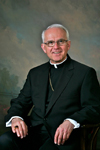March 12, 2025 Editor’s note: The following is Bishop Terry R. LaValley’s homily from the Rite of Election, celebrated March 9 at St. Mary’s Cathedral. On the first part I’ve been through the desert on a horse with no name. A few years ago, I reflected on these lyrics with you, and I thought a renewed consideration could be helpful for Lent 2025, this Jubilee Year of Hope. Now, I have a pretty good idea of your age if you recognize the words of this hit tune by America, called “A Horse with No Name.” Why in the world would the bishop call our attention again to this old-time classic on this the first part of the journey of Lent? Furthermore, what did the songwriter mean by a Horse with No Name? It’s reported that he said: “This anonymous horse was a vehicle to get me away from all the confusion and chaos of life to a peaceful, quiet place.” The rain symbolized all his problems, so he goes to the desert, where one wouldn’t expect all this rain (personal problems) to follow and soak him through and through. The desert was a getaway place for him, a place for thinking and exploring who he was. It’s appropriate that our Lent begins with a story in the desert. Perhaps it’s not feasible for most of us to visit a geographical desert. But we do have Lent, which serves as a desert of time, rather than of place. If we want to “remember our name” explore from the depths of our being who and whose we are, we can make Lent the vehicle, the time for such self-reflection. The Church describes Lent in many ways. We compare our forty days in the desert to Christ’s being in the desert forty days. We speak of fasting and abstinence. We understand Lent as being a time of self-sacrifice. Interestingly, the word Lent, itself means “spring.” Despite our descriptions, Lent is not so much intended to be a bleak and dark time in which we match our spiritual mood with that of the darkness of winter. Lent is intended to be a new beginning, a new springtime in which we reinvigorate our faith. Fasting, abstinence and self-sacrifice are not the point of Lent. These traditional disciplines are the tools of Lent to help us explore who we are and how we might grow closer to One Who is the source of all our blessings. Our task in Lent is like that of Israel’s forty days in the desert. It is an opportune time to take a good, hard look at ourselves – our lives and our behaviors, especially because we owe absolutely everything to God. During Lent we are encouraged to put aside all else and devote ourselves to concentrating on our relationship with God and the temptations in our lives that threaten to harm that relationship. We use fasting and self-denial to do this. Notice that the remedies of the three temptations that Jesus encountered in the desert are addressed with the three practices that our Church invites us to take up during this Sacred Season: fasting, almsgiving and prayer. By fasting and other acts of self-denial, we learn self-control. By almsgiving, we practice detachment from material things and avoid creating false needs for ourselves. By prayer, especially using the Scriptures as Jesus did, we humble ourselves before God, relying on His grace. These disciplines are tools to help us focus. At Mass, when we bring up our gifts of bread and wine, let us make a conscious effort to also bring our Lenten sacrifices to the altar. When the priest prays, “May the Lord accept this sacrifice…for the praise and glory of His Name,” let us be focused on the mystery of the moment, joining our own daily sacrifices with the sacrifice of Christ Himself to the Father. I hope that all the liturgies, prayers, acts of mercy and classes that the parish offers you this Lent will help you to stay focused on what will enhance your personal relationship with Jesus. It’s important, too, to remember to have patience with ourselves and with our neighbors during this Lenten journey. It can be a time to usher in a new springtime in our lives of faith…a new commitment to the Church and parish, a renewed enthusiasm to worship and praise the God who has spared nothing so we might enjoy eternal happiness. Can there be a better reason to be a true pilgrim of hope. This is truly a graced time in the desert to remember who you are and respond to God’s awesome gifts. As we set out on this first part of our journey of Lent, we welcome our catechumens and candidates to our beautiful Cathedral for the Rite of Election! It’s truly a day of blessing for the Diocese of Ogdensburg. Dear catechumens and candidates, with the continued guidance of your parish’s OCIA team and staff, please make these days of intense prayer a privileged time of personal encounter and shared joy with Jesus Christ. We are so grateful to all those, who in your faith journey, have been faithful companions: your family members, fellow parishioners, your pastors and members of the parish OCIA teams. Thank you for coming to St. Mary’s Cathedral this afternoon to be counted among the elect. I pray that, as you continue your pilgrimage of faith, that you develop the spiritual discipline of always being attentive to the blessings you’ve received in life and then giving praise and honor to God, the Source of all blessings, through your compassionate works of mercy and, of course in your participation in this great Prayer of Thanksgiving, Holy Eucharist. In the Lenten desert, we can remember our name, celebrate it and reclaim it – O Christian, disciple of Jesus, pilgrim of hope and child of God. May God be praised…forever may God be praised! |
|||||


